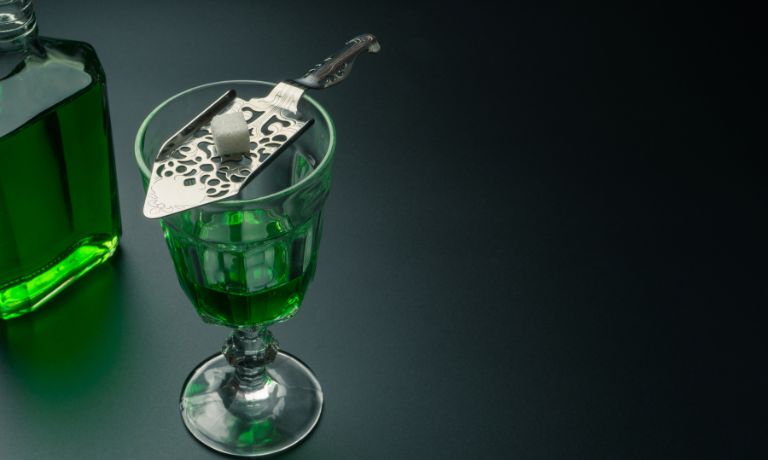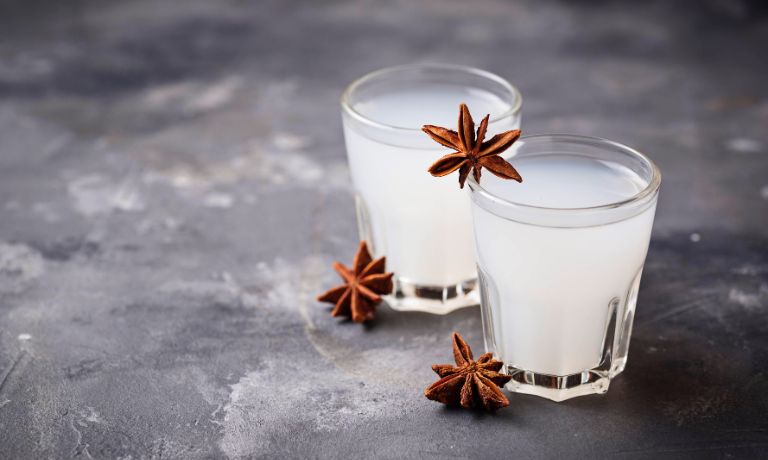Once an elusive and notorious drink, absinthe has made a resurgence in popular culture.
It is becoming increasingly available as bartenders and bar enthusiasts search for new ways to experience the unique flavor of the fabled spirit.
However, plenty of modern options can be used for all your absinthe-inspired cocktails!
Here you will find all the information necessary to become an expert in selecting just the right substitute for absinthe so you can get creative with your drinks menu!
What Is Absinthe?
Absinthe is an alcohol-based drink made from herbs, including grand wormwood, anise, and fennel.
It was created in Switzerland in the late 18th century as a medicinal elixir.
Absinthe’s unique taste and effects earned it a reputation as a dangerous psychedelic drug that caused hallucinations and madness.
However, modern research has debunked these claims and absinthe is now widely enjoyed as a spirit.
Absinthe can be enjoyed in various ways, including neat (straight from the bottle), mixed with other spirits or liqueurs, or diluted with water.
When diluting absinthe with water, it will turn cloudy due to the release of essential oils in the alcohol.
This is known as ‘the louche effect’, a sign that the absinthe has been properly mixed.
Absinthe can also be enjoyed in cocktails, such as the classic Death in the Afternoon, which combines absinthe with champagne.
It can also be added to coffee drinks or desserts for an interesting flavor twist.

Substitutes For Absinthe
Absinthe may be hard to find in some countries due to its high alcohol content.
Fortunately, some excellent substitutes can provide similar aromas and flavors to Absinthe.
Here are some of the most popular options:
Arak
Arak is an alcoholic beverage distilled from grapes, dates, figs, or other fruits, depending on the region.
It is a clear, strong liquor that can range from 40-63 percent alcohol by volume (ABV).
Arak is most commonly found in Middle Eastern countries such as Lebanon and Iran.
In the Middle East, Arak is often served with mezze, a selection of small dishes that accompany alcoholic drinks.
Mezze can include pickles, olives, salads, and various spreads. It is often mixed with fruit juices or other sweet beverages to make it palatable.
Arak is often called the Middle Eastern equivalent of Absinthe due to its high alcohol content and aniseed flavor.
Unlike Absinthe, Arak is not traditionally prepared with flame-pouring or other dramatic rituals, and it does not contain wormwood or green food coloring like Absinthe.

Anisette
Anisette is a liqueur originating from the anise plant, which is closely related to absinthe.
It has a sweet, licorice-like flavor and aroma and can range in color from clear to dark brown.
As with most alcoholic beverages, Anisette’s exact recipe and ingredients can vary depending on where it is produced, so some versions may contain other herbs or spices.
Anisette is often used in cocktails such as the Sazerac and French 75 and various coffee drinks. It can also be served neat or on the rocks.
Its sweet taste makes it a suitable substitute for absinthe in many recipes that traditionally use this drink.
The lower proof of Anisette (typically between 30-50% ABV) also makes it a much more approachable drink than Absinthe, which normally has a higher alcohol content.
Additionally, Anisette is more widely available and usually less expensive than Absinthe.
Chinchón
Chinchón is a type of anise-flavored liqueur made from various herbs, including the flowers and leaves of Artemisia absinthium, also known as Wormwood, which gives it its distinctive flavor.
Chinchón can be sipped neat or used in cocktails for a unique twist on classic drinks. It is often enjoyed by itself as a digestive liqueur.
Chinchón can also be an ingredient in many classic cocktails, such as the Sazerac and Corpse Reviver No. 2.
Additionally, it can add interesting herbal notes and complexity to drinks like martinis or gin-based drinks.
Chinchón can be used instead of Absinthe, giving it the same slightly bitter taste and herbal aroma.
In addition, Chinchón is less expensive than Absinthe and can be found more widely available across many countries.
Herbsaint
Herbsaint is a liqueur that has been around since the late 1800s and was created as a substitute for Absinthe.
It uses star anise, fennel, and other herbs to give it the same flavor profile as Absinthe but without the dangerous levels of thujone found in true Absinthe.
Herbsaint is lower in alcohol content than Absinthe, as well, and has a sweet taste that is similar to anise-flavored liqueurs like Pernod.
Herbsaint can be used in cocktails or enjoyed on its own over ice. It can also be used in recipes like Sazeracs and other classic cocktails.
When substituting Herbsaint for Absinthe, remember that the flavor profile will be different from traditional Absinthe and may require some experimentation before the desired result is achieved.
Ouzo
Ouzo is a traditional Greek anise-flavored spirit distilled from either grapes or grain.
It has become the national drink of Greece, and it is popular throughout the Mediterranean and other parts of Europe.
Ouzo can be enjoyed neat, on the rocks, or with a splash of water to help open up the flavor.
It can also be a base for creative cocktails or an after-dinner digestif.
Due to its similarities in flavor to absinthe, ouzo can be used as a substitute in some recipes.
The subtle sweetness of the anise is similar but without the presence of wormwood and other herbs found in absinthe.
Ouzo also has a lower alcohol content than absinthe, making it more suitable for those sensitive to alcohol or seeking a milder spirit.

Pastis
Pastis is an anise-flavored liqueur popular in France and other parts of Europe since the early twentieth century.
It is made from neutral alcohol, water, sugar, and star anise, with several other herbs and spices added for flavor.
Pastis is often served as an after-dinner drink or as a digestif, and it can be either served neat or diluted with a bit of cold water.
When diluted, Pastis takes on an opalescent appearance similar to Absinthe’s green hue.
Pastis can also make cocktails and other alcoholic drinks, such as the well-known French 75.
It may also add flavor and complexity to other cocktails and drinks.
Raki
Raki is an alcoholic drink made from various fruits and widely consumed in Turkey and other Balkans.
It is a clear spirit that usually contains 40% to 45% ABV (alcohol by volume).
It can be distilled from grapes or figs, but it is most commonly distilled from raisins.
Raki has a strong aroma and flavor which is often described as aniseed-like.
It has a range of herbal and floral notes, and can be quite strong in taste.
Raki can be a substitute for absinthe in cocktails where the aniseed or licorice flavor is desired.
Raki is most commonly enjoyed as an aperitif before meals or social gatherings, though it can also be used to make cocktails or mix with other drinks.
In Turkey, it is traditionally served mixed with cold water, a cube of ice, and meze dishes.
Sambuca
Sambuca is an Italian liqueur made from anise, star anise, and other spices.
It is usually enjoyed as a digestif after meals but can also be used to make cocktails.
Sambuca has a sweet flavor and licorice aroma, making it a popular choice for many drinks.
It is typically served neat or with ice, but it can also be used to create a variety of cocktails.
Sambuca is often used as an alternative to absinthe.
Unlike Absinthe, Sambuca is much more widely available in bars and liquor stores, making it easier to find.
Despite their similarities in flavor, Sambuca is less potent than absinthe.
It has a lower alcohol content, making it safer for those who are more sensitive to alcohol or want a lighter drink.

FAQs
Is Jägermeister Comparable To Absinthe?
No, Jägermeister has no hallucinogenic effects that Absinthe is known for.
However, both drinks are herbal liqueurs and share some similar flavor notes.
Can Pastis Be Substituted For Absinthe?
Yes, pastis can be substituted for absinthe in some cocktails.
While it does not have the same herbal and anise flavor as absinthe, it still contains many of the same ingredients and can make a decent substitute in certain drinks.
Is Pernod Similar In Taste To Absinthe?
Although Pernod and Absinthe differ in taste.
Absinthe has a more distinct herbal flavor due to its higher level of wormwood, which gives it a slightly bitter quality.
On the other hand, Pernod is sweeter and smoother because it contains fewer herbs and does not have as strong of a flavor.
Conclusion
Anisette, Chinchón, Herbsaint, Ouzo, Pastis, and Sambuca are all anise-flavored liqueurs that can be used as a substitute for absinthe in cocktails and other drinks.
Each of these spirits has its unique flavor profile and characteristics which may make them more suitable for some recipes than others.
Some of these liqueurs are easier to find than others, and some have a lower alcohol content than Absinthe.
No matter your choice, these anise-flavored liqueurs can add complexity and flavor to your favorite cocktails.

